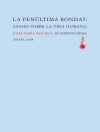This collection explores the arguments related to veg(etari)anism as they play out in the public sphere and across media, historical eras, and geographical areas. As vegan and vegetarian practices have gradually become part of mainstream culture, stemming from multiple shifts in the socio-political, cultural, and economic landscape, discursive attempts to both legitimize and delegitimize them have amplified. With 12 original chapters, this collection analyses a diverse array of these legitimating strategies, addressing the practice of veg(etari)anism through analytical methods used in rhetorical criticism and adjacent fields.
Part I focuses on specific geo-cultural contexts, from early 20th century Italy, Serbia and Israel, to Islam and foundational Yoga Sutras. In Part II, the authors explore embodied experiences and legitimation strategies, in particular the political identities and ontological consequences coming from consumption of, or abstention from, meat. Part III looks at the motives, purposes and implication of veg(etari)anism as a transformative practice, from ego to eco, that should revolutionise our value hierarchies, and by extension, our futures. Offering a unique focus on the arguments at the core of the veg(etari)an debate, this collection provides an invaluable resource to scholars across a multitude of disciplines.
Table des matières
Part I: Cultural and Historical Perspectives on Vegetarianism .- Chapter 1. State of Meatlessness: Voluntary and involuntary vetegarianism in early twentieth century Italy. Carol Helstolsy.- Chapter 2. Taking an Anti-Sacrificial Stance: The Essentializing Rhetoric and Affective Nature of Meat Consumption in Islam. Nora Abdul-Aziz, Daniella Fedak-Lengel, and Lara Martin Lengel.- Chapter 3. Because We Care: Veganism and Politics in Israel. Sharon Avital.- Chapter 4. Veg(etari)anism in Serbia: Attack on Traditional Values. Mirjana Uzelac.- Chapter 5. Ancient Text, Modern Context: Patanjali’s Yoga Sutras and the Twenty-First Century Veg(etari)an. Sharon Lauricella.-
Part II: Veg(etari)anism as Embodied Practice .- Chapter 6. The Accidental Vegetarian: Object-Oriented Ontology at the Intersection of Alpha-Gal Mammalian Meat Allergy. Elizabeth Baddour.- Chapter 7. ‘You Are What You Eat’: Oprah, Amarillo, and Food Politics. Callie Kostelich and Heidi Hakimi-Hood.- Chapter 8. Queer Hunger: Human and Animal Bodies in Djuna Barnes’
Nightwood. Molly Mann.-
Part III: Eco vs Ego: The transformative potential of veg(etari)anism .- Chapter 9. Laying Down with the Lamb: Abolitionist Veganism, the Rhetoric of Human Exceptionalism, and the End of Creation. David Stubblefield and Dynestee Fields.- Chapter 10. Feeling Bad? Veganism, Climate Change, and the Rhetoric of Cowspiracy. Alexa Weik von Mossner.- Chapter 11. Constituting Vegetarian Audiences: Orchestrations of Ecogenctric, Anthropocentric, Ecocentric Exigencies in Jonathan Safran Foer’s
Eating Animals. Oren Abeles and Emma Lozon.- Chapter 12. Beyond Diet: Veganism as Liberatory Praxis. Tara Roeder.
A propos de l’auteur
Cristina Hanganu-Bresch is Associate Professor of Writing and Rhetoric at the University of the Sciences, Philadelphia, USA. Her research on the rhetoric of psychiatry and scientific communication has appeared, among others, in Written Communication, Literature and Medicine, and Medical Humanities, and several edited collections. She co-authored Diagnosing Madness (2019) and Effective Scientific Writing (2020).
Kristin Kondrlik is an Assistant Professor of English specializing in Health Communication at West Chester University of Pennsylvania, USA. Her research focuses on wellness movements in historical and contemporary medical journals. Her scholarship has appeared in
Victorian Periodicals Review,
English Literature in Transition: 1880-1920, and
Poroi: Project on Rhetoric of Inquiry.












